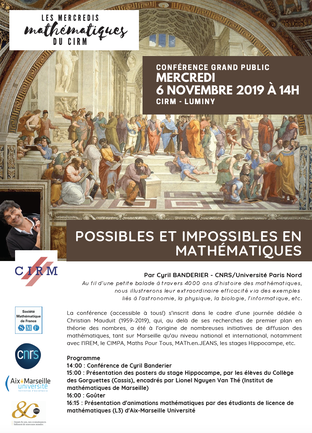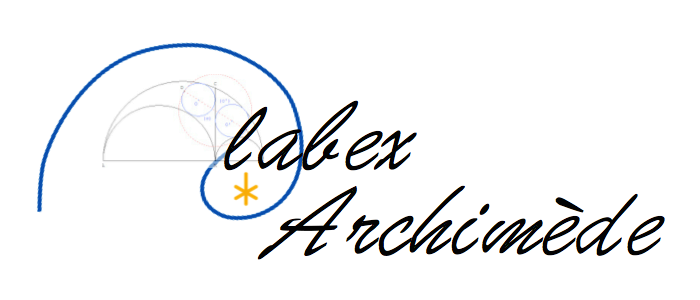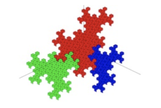Prime Numbers, Determinism and Pseudorandomness in Memoriam of Christian Mauduit (1959 – 2019)
Nombres premiers, déterminisme et pseudoaléa
4 – 8 November 2019
|
Organizing Committee & Scientific Committee
Comité d’organisation & Comité scientifique Cécile Dartyge (Université de Lorraine) |
GRAND PUBLIC – OUTREACH
|
|
The recent results of Green and Tao on the existence of arbitrarily long arithmetic progressions of prime numbers have showed the strength of the interactions between combinatorics, number theory and dynamical systems. Other advances, like the results of Bourgain, Green, Tao, Sarnak and Ziegler on the randomness principle for the Möbius function, the resolution of the Gelfond conjectures concerning the sum of digits of prime and square numbers, as well as those of Golston, Pintz and Yildirim and then Zhang and Maynard on small gaps between primes, the recent results of Pintz on the existence of arbitrarily long arithmetic progressions of generalized twin prime numbers show the vitality of this domain of research. The difficulty of the transition from the representation of an integer in a number system to its multiplicative representation (as a product of prime factors) is at the source of many important open problems in mathematics and computer science. The conference will be devoted to the study of independence between the multiplicative properties of integers and various ”deterministic” functions, i. e. functions produced by a dynamical system of zero entropy or defined using a simple algorithm. This area is developing very fast at international level and the conference will be an opportunity to help to develop techniques that were recently introduced to study of relations between prime numbers, polynomial sequences and finite automata, the study of the pseudorandom properties of certain arithmetic sequences and the search of prime numbers in deterministic sequences. This goal is related to several recent works by Bourgain, Green, Sarnak, Tao and others concerning the orthogonality of the Möbius function with deterministic sequences and obtaining prime number theorems for these sequences.
|
Les résultats récents de Green et Tao sur l’existence de progressions arithmétiques arbitrairement longues de nombres premiers ont montré la force de l’interaction entre la combinatoire, la théorie des nombres et les systèmes dynamiques. D’autres avancées comme les résultats de Bourgain, Green, Tao, Sarnak et Ziegler sur le principe d’aléa de la fonction de Möbius, la résolution des conjectures de Gelfond concernant la somme des chiffres des nombres premiers et celle des carrés, ainsi que ceux de Golston, Pintz et Yildirim, puis de Zhang et Maynard sur les petits écarts entre les nombres premiers et récemment de Pintz sur l’existence de progressions arithmétiques arbitrairement longues de nombres premiers jumeaux généralisés montrent la vitalité de ces domaines de recherche. La complexité inhérente au passage de la représentation d´un nombre entier dans un système de numération à sa représentation multiplicative (comme un produit de facteurs premiers) est à l’origine de plusieurs problèmes ouverts importants en mathématiques et en informatique. Le colloque sera dédié à l’étude de l’ind´eépendance entre les propriétés multiplicatives des nombres entiers et diverses fonctions ”déterministes”, c’est-à-dire produites par un système dynamique d’entropie nulle ou définies à l’aide d’un algorithme simple. Il s’agit d’une thématique actuellement en plein essor sur le plan international et le colloque permettra de développer les outils récemment mis en place pour étudier les relations entre nombres premiers, suites polynomiales et automates finis, l’étude des propriétés pseudo-aléatoires de certaines suites arithmétiques et la recherche de nombres premiers dans des suites déterministes, en lien avec plusieurs travaux récents de Bourgain, Green, Sarnak, Tao et d’autres auteurs concernant l’orthogonalité de la fonction de Möbius avec des suites déterministes et l’obtention éventuelle de théorèmes des nombres premiers pour ces suites.
|
Christoph Aistleitner (Graz University of Technology) On measures of pseudorandomness for finite binary sequences
Pierre Arnoux (Aix-Marseille Université) Christian Mauduit : 40 ans de popularisation des mathématiques, d’enseignement et de pédagogie
Valérie Berthé (CNRS Université Paris Diderot) Symbolic bounded remainder sets
Pierre-Yves Bienvenu (Université de Lyon) Density of sets and their sumsets
Cécile Dartyge (Université de Lorraine) On ellipsephic integers
Thierry De La Rue (CNRS Université de Rouen Normandie) Sarnak conjecture in density
Anne De Roton (Université de Lorraine) Fourier analysis as a tool in additive combinatorics : some examples
Michel Dekking (Delft University of Technology) . Beatty sequences and integers in golden mean base
Jean-Marc Deshouillers (Bordeaux INP) Randomness and non-randomness properties of Piatetski-Shapiro sequences modulo m
Ai Hua Fan (Université de Picardie Jules Verne & CCNU Wuhan) Growth of L^infty-norm of Generalized Thue-Morse polynomials and Dynamical maximization
Sébastien Ferenczi (I2M Marseille) Christian Mauduit et Gérard Rauzy, grands mathématiciens et bons folâtres
Katalin Gyarmati (Eötvös Loránd University, Budapest) Inequalities between correlation measures
François Hennecart (Université Jean Monnet Saint-Etienne) Thin sum-product bases in the integers
Teturo Kamae (Osaka City University) Randomness criterion
Mariusz Lemanczyk (Nicolaus Copernicus University Torun) Rigidity in dynamics and Möbius disjointness
Bruno Martin (Université du Littoral Côte d’Opale, Calais) On the digits of prime numbers
Carlos Matheus (CNRS Ecole polytechnique) Lagrange and Markov spectra and dynamics of horseshoes
Ali Messaoudi (São Paulo State University) Shadowing and Stability in p-adic dynamics
Mohamed Mkaouar (Université de Sfax) Lettre à mon maître
Carlos Gustavo Moreira (IMPA) Sequences on finite alphabets: my collaboration with Christian
Clemens Müllner (Université Claude Bernard Lyon 1) Subsequences of automatic sequences
Janos Pintz (Hungarian Academy of Sciences) On the Linnik-Goldbach problem
Martine Queffelec (Université de Lille) Non-normal sets
Joël Rivat (Aix-Marseille Université) Digits of prime numbers
András Sárközy (Eötvös Loránd University, Budapest) Working with Christian Mauduit (in memoriam Christian Mauduit)
Igor Shparlinski (University of New South Wales) Pseudorandomness of Kloosterman and Salie Sums
Thomas Stoll (Université de Lorraine, Site de Nancy) Sur un problème d’Erdös concernant les chiffres de 2^n en base 3 et le lemme de Hensel
Cathy Swaenepoel (Université de Montréal) Prime numbers with preassigned digits
Jun-Ichi Tamura (Tsuda College) Some problems and results around Pentagonal Number Theorem of Euler, and Moonshine
Gérald Tenenbaum (Université de Lorraine) Les petites sommes de Gál
Benjamin Weiss (Einstein Institute of Mathematics) Christian Mauduit in ergodic theory









